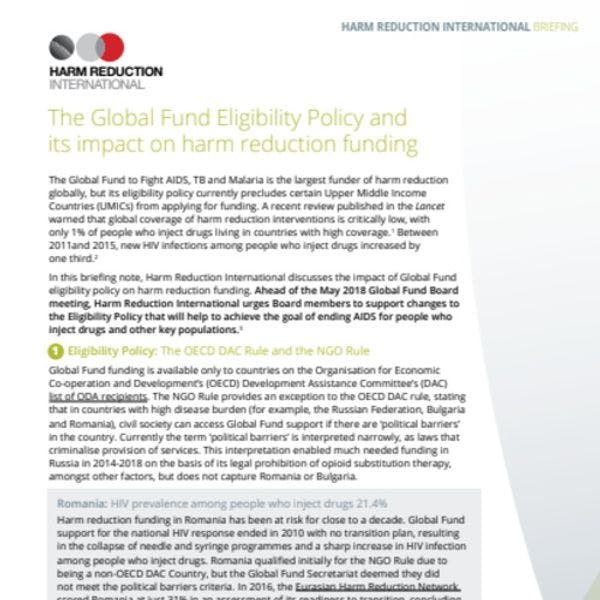Harm Reduction International calls for changes to Global Fund policy
The Global Fund to Fight AIDS, TB and Malaria is the largest funder of harm reduction globally, but its eligibility policy currently precludes certain Upper Middle Income Countries (UMICs) from applying for funding. A recent review published in the Lancet warned that global coverage of harm reduction interventions is critically low, with only 1% of people who inject drugs living in countries with high coverage. Between 2011and 2015, new HIV infections among people who inject drugs increased by one third.
In this briefing note, Harm Reduction International discusses the impact of Global Fund eligibility policy on harm reduction funding. Ahead of the May 2018 Global Fund Board meeting, Harm Reduction International urges Board members to support changes to the Eligibility Policy that will help to achieve the goal of ending AIDS for people who inject drugs and other key populations.
Global Fund funding is available only to countries on the Organisation for Economic Co-operation and Development’s (OECD) Development Assistance Committee’s (DAC) list of ODA recipients. The NGO Rule provides an exception to the OECD DAC rule, stating that in countries with high disease burden (for example, the Russian Federation, Bulgaria and Romania), civil society can access Global Fund support if there are ‘political barriers’ in the country. Currently the term ‘political barriers’ is interpreted narrowly, as laws that criminalise provision of services. This interpretation enabled much needed funding in Russia in 2014-2018 on the basis of its legal prohibition of opioid substitution therapy, amongst other factors, but does not capture Romania or Bulgaria.
In our 2017 report Harm Reduction Investment in the European Union: Current Funding, Challenges and Successes, we recommend the Global Fund should better define what is meant by ‘barriers’ under the NGO Rule and what constitutes proof that these are insurmountable enough to warrant Global Fund support. At the upcoming meeting in Macedonia, we urge the Global Fund Board to ensure a more expansive interpretation of ‘barriers’, enabling civil society to utilise the NGO rule in countries with significant human rights barriers, or a deficit of political will, such as Bulgaria and Romania. Ensuring an expansive interpretation would necessitate consultation with UN, partners, civil society and human rights experts.
